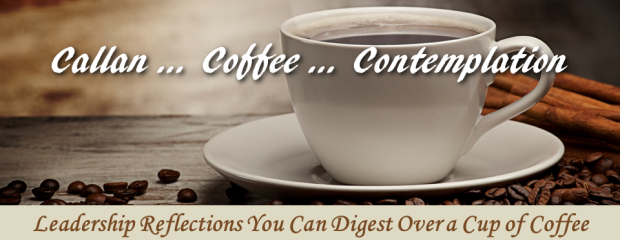Callan…Coffee…Contemplation for the Week of December 1st
Leadership Lullabies
One of the toughest tests of leadership is telling truth from fantasy, especially fantasies centered on our egos and the reputations of our groups. Over a period of time, if we lack truthful feedback mechanisms, we can become sleepwalkers—unquestioningly believing the press clippings about our personal leadership and the performance of our groups. I call this being in a state of “leadership lullabies,” because of the way we can slowly induce such illusions, and more dangerous yet, increasingly destroy any contrarian voices who may awaken us from such a dreamlike slumber. So, how do we avoid leadership lullabies? First, by developing the self-discipline and moral courage to look at our own attitude, behavior, and performance. Leaders must constantly ask themselves: Do I truly live up to the personal standards I set? Second, within our groups, leaders must create clear, candid feedback loops revealing when the real does not align with the ideal. Great leaders possess inner-discipline and moral courage to stay wide awake and, therefore, resist the siren’s call of leadership lullabies.
Reading as Action
Great leadership is the admixture of thought and action. Today, I want to reflect on the latter. Interestingly, as I’ve grown as a leader, I’ve come to view reading as a form of action. I find reading to be an intentional means to hone one’s intellect, remain curious and questioning, and develop a broad understanding of history and historical context needed for wise action. Reading is a leader’s investment in preparing for a future crossroads…a time of destiny we know will come, though we never know exactly the time, circumstances, or conditions of its arrival. Reading keeps one mentally sharp, emotionally engaged, and vitally wrestling with old assumptions and new possibilities. Moreover, reading provides a more truthful personal lens on living and leading, allowing one to possess the discernment to reduce complexity and theory down to their most basic elements. Great leaders read deeply, because they are people of action. We don’t read to go back in time; we read to bring the wisdom of deep time into us.
The Wilderness
A common theme in all heroic lives is a “wilderness” period. In mythic hero tales the wilderness was often a barren place; a desert, a vast ocean, a deep forest, or a high mountain. Understood correctly, this wilderness period in a hero’s development represented a phase of imbalance, loss, or defeat. Odysseus had wilderness periods, but so too did real heroes like Lincoln, Churchill, and Gandhi, to name a few. The wilderness appears at first to be signal defeat. But what we soon learn is the wilderness period is really a chance for conversion and rebirth into a truly great leader. The wilderness provides the crucible–the alchemic fire and pressure needed to transform the hero from the inside, out. The wilderness period is necessary for greatness; it is the essential cauldron needed to unleash the heroic Self. And the lesson for us? Whenever we find ourselves lost or adrift as leaders, we too are in the wilderness, a time of tests and trials. What we do in the wilderness, within ourselves, makes all the difference in our destiny.
Talk Without Speaking
To be a highly effective leader one must speak and do so publically. Our people need to hear us directly, in terms of our vision, ethos, and cornerstone principles of our organizations. What I constantly remind myself of, though, is this fact: Most of the time our communication is done by talking without speaking. What do I mean? Our message is most strongly conveyed through personal modeling and example setting. The greatest delivery system for our message is ourselves—the messenger. Who we are, how we live our lives, how we treat others, and the quality of our inner life are the strongest ambassadors of our message and beliefs. Moreover, how well we personally align with our message will determine, more than any other factor, whether that message is believed, accepted, and embraced by others. Leaders must model, in both action and deed, the core components of their vision, ethos, and virtue. When message and messenger are fully aligned, magic happens. When misaligned, illusion and confusion reign. Great leaders learn to talk without speaking.
Check back next Monday for a round up of this week’s social media shares. Or check us out on Facebook, Twitter, Google+, or Pinterest to see our posts every day!
Tweet Share






